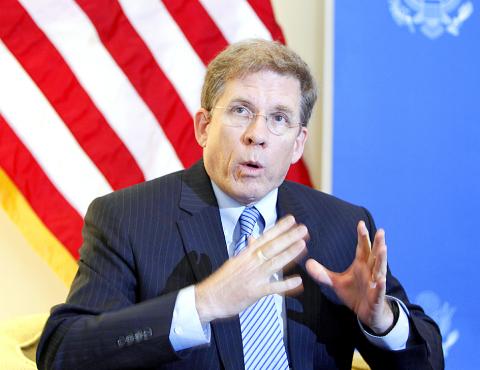A top US diplomat for Southeast Asia yesterday urged Pacific island nations not to withdraw diplomatic recognition of Taiwan, warning that Chinese pressure to change Taiwan’s international standing threatens to increase the possibility of conflict.
US Principal Deputy Assistant Secretary of State for East Asian and Pacific Affairs W. Patrick Murphy spoke to reporters in Canberra at the end of a three-day visit to Australia for talks with government officials on expanding their security alliance.
Six Pacific island nations have diplomatic relations with Taiwan, accounting for one-third of the nation’s diplomatic allies around the world, but they are under intensifying pressure from Beijing to switch allegiance as it builds its influence in the region.

Photo: AP
Murphy said that diplomatic decisions should not be influenced by China.
“China is attempting to reduce Taiwan’s diplomatic relations in the region and that’s kind of heavy-handed,” Murphy said. “It gives rise to tensions by changing the ‘status quo’ and then the possibility of conflict.”
Then-Solomon Islands prime minister Rick Hou had promised to review the nation’s relations with Taiwan before he lost power in last month’s elections.
Switching recognition to China, the Solomon Islands’ biggest export market, remains a live issue.
Murphy said that the US has “strong diplomatic relations” with the Solomon Islands and had congratulated newly elected Solomon Islands Prime Minister Manasseh Sogavare.
Murphy declined to say whether he discussed with Australian officials concerns of some security analysts that China wants to construct a deep-water military base somewhere in the Pacific.
Chinese militarization in the Pacific would be as destabilizing as its militarization of disputed islands in the South China Sea, he said.
“A growing military presence anywhere in the region of a country like China that doesn’t work on a rules-based approach or adhere to international standards is and should be of concern,” Murphy said. “We have a lot of national interests in the region that are built on freedoms of commerce, navigation and overflight. We have key partners and the establishment of a military presence there, the notion, the concept, is indeed quite troubling.”
Murphy today is due to fly to Australia’s nearest neighbor, Papua New Guinea, where pro-Beijing Papua New Guinean Prime Minister Peter O’Neill backs China’s territorial claims in the South China Sea.
The US and Australia have committed to redevelop a naval base on Manus Island.
Murphy said that the Lombrum Naval Base expansion was about a “partnership with Papua New Guinea and meeting its needs,” not denying China a military presence in the nation of more than 8 million people.
When Australia and Papua New Guinea announced the upgrade in October last year, China cautioned both nations to discard “Cold War” thinking, referring to an era when the world was less integrated.
“The Pacific island countries should not be the sphere of influence of any country,” Chinese Ministry of Foreign Affairs spokesman Lu Kang (陸慷) said at the time.

Intelligence agents have recorded 510,000 instances of “controversial information” being spread online by the Chinese Communist Party (CCP) so far this year, the National Security Bureau (NSB) said in a report yesterday, as it warned of artificial intelligence (AI) being employed to generate destabilizing misinformation. The bureau submitted a written report to the Legislative Yuan in preparation for National Security Bureau Director-General Tsai Ming-yen’s (蔡明彥) appearance before the Foreign Affairs and National Defense Committee today. The CCP has been using cognitive warfare to divide Taiwanese society by commenting on controversial issues such as Taiwan Semiconductor Manufacturing Co’s (TSMC, 台積電) investments in the

HELPING HAND: The steering committee of the National Stabilization Fund is expected to hold a meeting to discuss how and when to utilize the fund to help buffer the sell-off The TAIEX plunged 2,065.87 points, or 9.7 percent, to close at 19,232.35 yesterday, the highest single-day percentage loss on record, as investors braced for US President Donald Trump’s tariffs after an extended holiday weekend. Amid the pessimistic atmosphere, 945 listed companies led by large-cap stocks — including Taiwan Semiconductor Manufacturing Co (TSMC, 台積電), Hon Hai Precision Industry Co (鴻海精密) and Largan Precision Co (大立光) — fell by the daily maximum of 10 percent at the close, Taiwan Stock Exchange data showed. The number of listed companies ending limit-down set a new record, the exchange said. The TAIEX plunged by daily maxiumu in just

INVESTIGATION: The case is the latest instance of a DPP figure being implicated in an espionage network accused of allegedly leaking information to Chinese intelligence Democratic Progressive Party (DPP) member Ho Jen-chieh (何仁傑) was detained and held incommunicado yesterday on suspicion of spying for China during his tenure as assistant to then-minister of foreign affairs Joseph Wu (吳釗燮). The Taipei District Prosecutors’ Office said Ho was implicated during its investigation into alleged spying activities by former Presidential Office consultant Wu Shang-yu (吳尚雨). Prosecutors said there is reason to believe Ho breached the National Security Act (國家安全法) by leaking classified Ministry of Foreign Affairs information to Chinese intelligence. Following interrogation, prosecutors petitioned the Taipei District Court to detain Ho, citing concerns over potential collusion or tampering of evidence. The

‘COMPREHENSIVE PLAN’: Lin Chia-lung said that the government was ready to talk about a variety of issues, including investment in and purchases from the US The National Stabilization Fund (NSF) yesterday announced that it would step in to staunch stock market losses for the ninth time in the nation’s history. An NSF board meeting, originally scheduled for Monday next week, was moved to yesterday after stocks plummeted in the wake of US President Donald Trump’s announcement of 32 percent tariffs on Taiwan on Wednesday last week. Board members voted to support the stock market with the NT$500 billion (US$15.15 billion) fund, with injections of funds to begin as soon as today. The NSF in 2000 injected NT$120 billion to stabilize stocks, the most ever. The lowest amount it